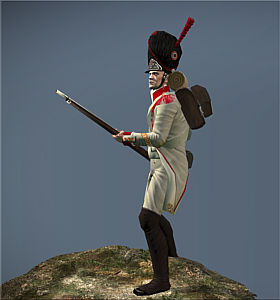Difference between revisions of "Dutch Grenadiers (NTW Unit)"
Tango12345 (talk | contribs) m (Removed category "NTW Unit"; Quick-adding category "NTW Units" (using HotCat)) |
Tango12345 (talk | contribs) m (Quick-adding category "NTW Infantry" (using HotCat)) |
||
| Line 12: | Line 12: | ||
[[Category:NTW Units]] | [[Category:NTW Units]] | ||
| + | [[Category:NTW Infantry]] | ||
Latest revision as of 07:50, 30 May 2017
Overview
Dutch Grenadiers see themselves as elite soldiers and occupy the place of honour at the right of the line on parade. This sense of inherent worth helps to inspire other soldiers and instils a sense of pride in the troops. They are incredibly disciplined and can reload their weapons at breathtaking speed, discharging them with relatively good accuracy. Their extensive training makes them more expensive to raise than other infantry units but, like all foot soldiers, they must exercise sensible caution when facing heavy cavalry and skirmishers.
The Dutch Grenadiers became part of Napoleon’s army following his 1810 annexation of Holland. At that time they were the Dutch Royal Grenadiers, and the men of this regiment entered Paris in August of 1810. Napoleon reviewed the troops personally and was very impressed by the fine appearance of the men. They wore white coats faced with crimson, instead of the traditional dark blue worn by other senior regiments (later other units wore white, but this was because the British blockade affected dye supplies). The Guard Grenadiers were not as impressed however, and the first meeting of these two regiments ended in a near-riot. Their behaviour was so appalling that they were forced to apologise to the general public for their rowdy and drunken antics.
